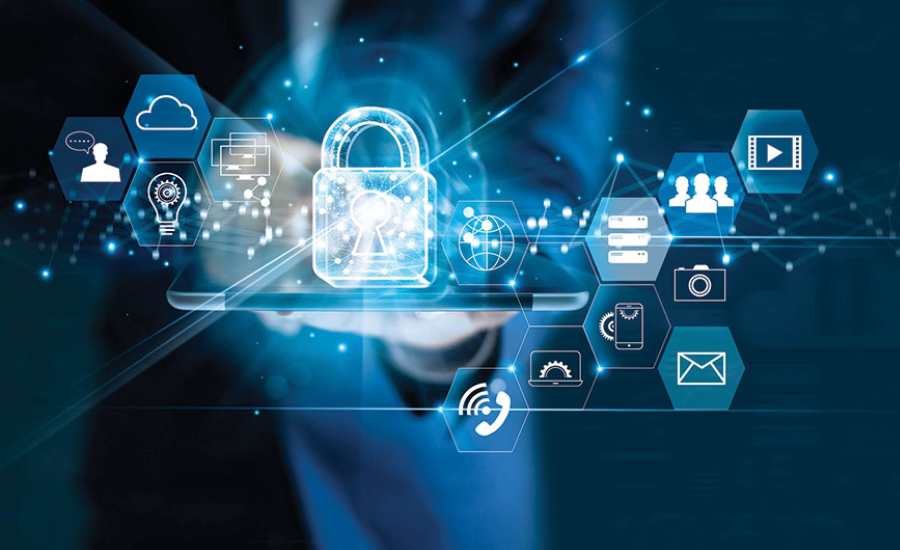In our increasingly connected world, technology giants control the global security landscape in a crucial way. With the convergence of digital and physical systems, leaders in software and hardware development are at the forefront of enhancing security across various domains. These tech giants are driving innovation in security technologies and playing a significant role in influencing global security standards and policies. Gaining insight into their contributions helps us understand how they are shaping the trajectory of international security and stability.
Understanding Global Tech Security

Global Tech Security pertains to the comprehensive approach of safeguarding assets and ensuring safety within both digital and physical environments through advanced technological solutions. This broad concept includes various practices, tools, and strategies employed by individuals, organizations, and governments to defend against threats like cyber-attacks, data breaches, and vulnerabilities in physical security.
The emphasis is on utilizing technology to maintain the integrity, confidentiality, and availability of data and systems across international borders. In this context, technology giants control the global security landscape by setting standards and driving innovations that shape how security is managed worldwide, highlighting its importance in our interconnected world.
Key Aspects Of Global Technology Security
Global Technology Security encompasses a range of critical areas, including:
- Cybersecurity: Protecting digital systems, networks, and data from threats and unauthorized intrusions.
- Physical Security Technologies: Employing advanced tools such as surveillance systems, biometric authentication, and automated access controls to protect physical assets.
- Data Protection: Ensuring the safety of personal and organizational information by preventing unauthorized access and adhering to data privacy regulations.
- Network Security: Implementing protective measures to maintain the integrity and functionality of networks through both hardware and software solutions.
- Cloud Security: Protecting data and services hosted on remote servers accessible via the internet, ensuring secure data management and storage.
- IoT Security: Addressing security concerns related to the integration of internet-connected devices and appliances.
The Emergence Of Technology Giants In The Security Sector
The growing influence of major technology companies in the security industry is a notable trend driven by their extensive technological expertise, large user bases, and strategic goals in protecting their platforms while providing security solutions. These technology giants control the global security landscape by expanding their roles in this domain.
Entering The Security Domain
Initially, tech leaders like Google, Amazon, Microsoft, and Apple concentrated on software, hardware, and e-commerce. As these companies’ operations expanded, so did their vulnerability to security threats. This led to the development of comprehensive internal security protocols, which eventually evolved into commercial security products and services. For example, Amazon’s acquisition of Ring enhanced its home security offerings, while Microsoft introduced Azure Security to address cloud security needs.
Acquisitions And Technological Advancements
Tech giants frequently enter the security market by acquiring innovative security firms and integrating cutting-edge technologies into their existing offerings. Their substantial investment in research and development ensures continuous advancement in security solutions, maintaining their leadership in the sector.
Data Management And Insight
By leveraging their extensive data resources, these companies obtain critical insights into emerging security threats. By leveraging this data, they create advanced predictive security tools and intelligence capabilities. Google, for instance, uses machine learning to identify and address potential threats in real-time across its services.
Shaping Security Standards
Due to their significant influence and the widespread use of their platforms, tech giants play a key role in developing and setting security standards and protocols. Their involvement in standard-setting processes often establishes industry benchmarks for global security.
Security As A Service (SecaaS)
In response to the rise of cloud computing, many tech giants now offer Security as a Service (SecaaS). This model provides robust security management and support through their platforms, enabling even smaller organizations to access high-quality security technologies without substantial initial costs.
Navigating Global And Regulatory Landscapes
Operating on a global scale, these companies face diverse regulatory requirements, compelling them to uphold stringent security and compliance standards across various jurisdictions. Their global reach allows them to develop adaptable security solutions that adhere to international regulations, such as the GDPR in Europe.
Collaborative Efforts
Technology giants frequently collaborate with governments and various organizations to improve security measures.Their involvement in national cybersecurity initiatives and collaborations with law enforcement agencies highlights their vital role in supporting public sector security efforts, reinforcing how these technology giants control global security.
Navigating Data Privacy And Control Challenges

The management of data and privacy issues is a central topic in today’s discussions about technology and security. As major tech companies control the global security landscape and gain oversight over vast quantities of data, the implications for individual privacy and data protection become increasingly significant.
Extensive Data Collection
Leading technology companies gather vast amounts of user data, including personal details, location information, and online behaviors. This data is crucial for delivering tailored services, targeted advertisements, and improving user experiences. However, the extensive nature of this data collection raises substantial privacy concerns, particularly regarding its usage and accessibility, especially as these companies control global security through their data management.
Data Usage And Lack Of Transparency
A major issue is the often opaque nature of data usage by these companies. While data is frequently utilized to enhance services, there are instances where it is sold to third parties or used in ways that users may not fully understand or have consented to. This opacity can erode trust and compromise user privacy, highlighting how technology giants control global security while managing user data.
Protecting Data Security
The responsibility to secure data is immense. Tech giants must ensure robust defenses against breaches, hacks, and unauthorized access. Data breaches can reveal sensitive personal information, potentially leading to financial losses, identity theft, and other severe impacts. The rise in data breaches has heightened concerns about these companies’ ability to protect user information, underscoring the critical role they play in controlling global security.
Adhering To Regulatory Standards
As global concerns over data privacy grow, tech companies must navigate complex regulatory landscapes. Laws like the General Data Protection Regulation (GDPR) in Europe and the California Consumer Privacy Act (CCPA) in the United States set strict standards for data privacy and user rights.
Compliance with these laws is essential not only for legal adherence but also for maintaining user trust and corporate reputation, reflecting the significant role these companies play in controlling global security.
Enhancing User Control And Rights
There is an increasing demand for users to have more control over their data. People want to manage how their information is collected, utilized, and shared. In response, many tech companies are developing more comprehensive data management tools, including options for data downloads, account deletions, and detailed privacy settings. However, the effectiveness and ease of use of these tools can vary widely, highlighting the ongoing challenge of balancing user rights with the broader objective of technology giants controlling global security.
Emerging Trends And Innovations Shaping The Future

The technology landscape is advancing at a rapid pace, with emerging trends and innovations poised to transform industries and enhance daily living. Here’s an overview of the key advancements:
Progress In Artificial Intelligence And Machine Learning
Artificial Intelligence (AI) and Machine Learning (ML) are set to drive future innovations by focusing on ethical AI practices, increased accessibility, and expanded automation across various sectors. Future developments aim to improve efficiency in tasks ranging from healthcare diagnostics to customer service automation. Additionally, AI’s role in predictive analytics and personalized recommendations is expected to grow, offering more tailored user experiences while addressing ethical concerns related to bias and privacy.
The Promise Of Quantum Computing
Quantum computing is in its early stages but holds the promise of revolutionizing fields that require substantial computational power. This includes complex simulations in pharmaceutical research, where quantum computers could model molecular interactions with unprecedented accuracy, and financial modeling, where they could optimize risk assessment and portfolio management.Quantum computing’s potential to address challenges beyond the reach of classical computers could result in significant advancements in materials science, cryptography, and other fields.
Expanding Internet Of Things (IoT)
The Internet of Things is advancing towards creating interconnected smart environments such as intelligent cities and smart homes. IoT devices are expected to enhance energy management by integrating with smart grids, improve traffic flow through real-time data analysis, and support personal health with connected wearables that monitor and analyze health metrics. The integration of IoT with AI and data analytics will enable more proactive and personalized responses to environmental and health conditions.
Augmented And Virtual Reality Innovations
Augmented Reality (AR) and Virtual Reality (VR) are advancing to deliver increasingly immersive experiences in entertainment, education, and business. AR will enhance user interactions by overlaying digital information on the real world, which is useful in applications like navigation and training simulations. VR, on the other hand, will offer fully immersive experiences that can transform areas such as remote learning and virtual collaboration. These technologies are expected to be significantly enhanced by the rollout of 5G and advancements in AI, providing more realistic and interactive experiences.
The Evolution Of 5G And Beyond
The deployment of 5G technology is crucial for the development of advanced applications such as autonomous vehicles and smart infrastructure. 5G’s high-speed, low-latency connectivity will support a vast array of smart devices and IoT systems, enabling seamless communication and data transfer. Research into 6G technology is already underway, promising even greater advancements in network speed, capacity, and reliability, potentially revolutionizing digital communication and connectivity on a global scale.
Blockchain And Decentralized Finance (DeFi)
Blockchain technology, initially popularized by cryptocurrencies, is now set to transform secure transactions and data management across various sectors. Its ability to provide transparent and tamper-proof records is being applied to supply chain management, identity verification, and more. Decentralized Finance (DeFi) is challenging traditional financial systems by offering decentralized financial services, such as lending and trading platforms, which operate without intermediaries, potentially increasing financial inclusion and reducing costs.
Innovations In Sustainable Technology
Advancements in sustainable technology are critical in addressing climate change and environmental challenges. Innovations in renewable energy, such as more efficient solar panels and wind turbines, are being developed to reduce dependence on fossil fuels. Efforts in energy storage solutions, like advanced battery technologies, aim to enhance the reliability and efficiency of renewable energy sources. Additionally, green technologies are being integrated into industrial processes to minimize carbon emissions and environmental impact, supporting global sustainability goals.
Facts
The Impact Of Technology Companies On Global Security
Tech Giants’ Influence
Major firms like Google, Amazon, Microsoft, and Apple are crucial in global security, advancing technologies and setting international standards.
Internal Security Measures
Companies are enhancing their security. For example, Amazon’s 2018 Ring acquisition boosted home security, while Microsoft’s Azure Security focuses on cloud protection.
Understanding Global Tech Security
Cybersecurity Market
Valued at $210 billion in 2022, the market is set to grow to $345 billion by 2026 due to rising threats and demand for advanced solutions.
Data Protection Regulations
Since its implementation in 2018, the General Data Protection Regulation (GDPR) has established international benchmarks for data privacy.
Key Aspects Of Global Technology Security
Cybersecurity Threats
Cybercrime could cause $10.5 trillion in damages annually by 2025, underscoring the need for robust security measures.
IoT Security Risks
Over 30 billion IoT devices are expected by 2025, presenting significant security challenges.
The Emergence Of Technology Giants In The Security Sector
Acquisitions
Tech giants are enhancing security through acquisitions, such as Google’s 2023 purchase of Mandiant for improved cybersecurity.
SecaaS Growth
The Security as a Service market is expected to reach $108 billion by 2025, reflecting increased adoption of cloud-based solutions.
Navigating Data Privacy and Control Challenges
Data Breaches
In 2022, over 1,800 breaches exposed 20 billion records, highlighting the need for strong data protection.
User Data Management
Companies like Facebook offer tools for managing data in compliance with privacy regulations, though effectiveness can vary.
Emerging Trends And Innovations
AI Growth
The AI market is projected to grow from $136 billion in 2022 to $1.8 trillion by 2030.
Quantum Computing
Companies such as IBM and Google are advancing quantum computing, with Google achieving quantum supremacy in 2019.
5G Deployment
By 2024, over 1.5 billion 5G connections are expected globally, with coverage reaching 60% of the population by 2025.
Blockchain and DeFi
The blockchain market, including decentralized finance, was valued at $5 billion in 2021 and is projected to exceed $67 billion by 2026.
Sustainable Technology
The renewable energy market, worth $1.5 trillion in 2022, is expected to grow to $2.7 trillion by 2027, driven by advancements in green tech.
FAQs
Q: What challenges do technology companies face in global security?
A: Technology companies contend with evolving cyber threats, diverse international regulations, and the complexity of interconnected systems. They must also balance innovation with security and maintain user trust amid data breaches and privacy issues.
Q: How do technology companies stay ahead of emerging security threats?
A: Companies invest in research and development, update security protocols, and collaborate with others. They use AI and machine learning to anticipate and counteract new threats.
Q: What role do technology companies play in setting security standards?
A: They influence security standards by participating in standard-setting bodies and working with industry groups to establish best practices that shape global security benchmarks.
Q: How do technology companies balance security with user convenience?
A: Companies aim to implement strong security measures without complicating user experiences. They focus on creating user-friendly security solutions that do not sacrifice effectiveness.
Q: What impact does regulatory compliance have on technology companies’ security practices?
A: Compliance with laws like GDPR and CCPA drives companies to enforce stringent security measures, conduct audits, and manage data carefully to avoid penalties and protect user information.
Q: How are technology companies addressing the security risks of emerging technologies?
A: They integrate security features into new technologies, conduct risk assessments, and update systems regularly. Companies also collaborate with experts to manage vulnerabilities in innovations like AI and IoT.
Conclusion
In our increasingly connected world, technology companies are central to global security. Their impact is seen through their development of advanced security technologies, strategic acquisitions, and influence on international standards. By prioritizing cybersecurity, data protection, and innovative security solutions, these tech giants help safeguard both digital and physical realms. As emerging technologies like AI, quantum computing, and 5G advance, they will shape future security measures. Grasping these dynamics is vital for navigating the evolving landscape of global technology security and ensuring a safer future.
Stay in touch for more updates and alerts visit: GlobeAndMails!
